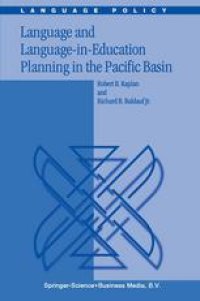
Ebook: Language and Language-in-Education Planning in the Pacific Basin
- Tags: Applied Linguistics, Sociolinguistics, Language Education, Asian Languages, History
- Series: Language Policy 2
- Year: 2003
- Publisher: Springer Netherlands
- Edition: 1
- Language: English
- pdf
Language and Language-in-Education Planning in the Pacific Basin examines and reviews the ecological context (including, e.g., the historical, political and educational issues) of language planning in 14 countries in the Pacific basin: Japan, the two Koreas, Taiwan, the Philippines, Indonesia, Malaysia, Brunei Darussalam, Singapore, Australia, New Zealand, Papua New Guinea, the Solomon Islands and Vanuatu. The planning goals pursued in these states are then examined in terms of an overarching view of language planning.
The book provides the only up-to-date overview and review of language policy in the region and challenges those interested in language policy and planning to think about how such goals might be achieved in the context of language ecology. In a world where languages and their uses and users are changing rapidly, and where governments and other political bodies are driving planned language change, there is a need to understand and consider how and why language planning is done.
The book will be of interest to specialists interested in language and education, and to more general readers wishing to understand the dynamics of history and politics and its impact on language and language-in-education policy decisions.
Language and Language-in-Education Planning in the Pacific Basin examines and reviews the ecological context (including, e.g., the historical, political and educational issues) of language planning in 14 countries in the Pacific basin: Japan, the two Koreas, Taiwan, the Philippines, Indonesia, Malaysia, Brunei Darussalam, Singapore, Australia, New Zealand, Papua New Guinea, the Solomon Islands and Vanuatu. The planning goals pursued in these states are then examined in terms of an overarching view of language planning.
The book provides the only up-to-date overview and review of language policy in the region and challenges those interested in language policy and planning to think about how such goals might be achieved in the context of language ecology. In a world where languages and their uses and users are changing rapidly, and where governments and other political bodies are driving planned language change, there is a need to understand and consider how and why language planning is done.
The book will be of interest to specialists interested in language and education, and to more general readers wishing to understand the dynamics of history and politics and its impact on language and language-in-education policy decisions.